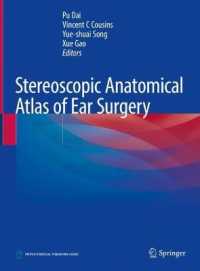- ホーム
- > 洋書
- > 英文書
- > Psychology
Full Description
In The Psychoanalytic Ear and the Sociological Eye: Toward an American Independent Tradition, Nancy J. Chodorow brings together her two professional identities, psychoanalyst and sociologist, as she also brings together and moves beyond two traditions within American psychoanalysis, naming for the first time an American independent tradition. The book's chapters move inward, toward fine-tuned discussions of the theory and epistemology of the American independent tradition, which Chodorow locates originally in the writings of Erik Erikson and Hans Loewald, and outward toward what Chodorow sees as a missing but necessary connection between psychoanalysis, the social sciences, and the social world.
Chodorow suggests that Hans Loewald and Erik Erikson, self-defined ego psychologists, each brings in the intersubjective, attending to the fine-tuned interactions of mother and child, analyst and patient, and individual and social surround. She calls them intersubjective ego psychologists—for Chodorow, the basic theory and clinical epistemology of the American independent tradition. Chodorow describes intrinsic contradictions in psychoanalytic theory and practice that these authors and later American independents address, and she points to similarities between the American and British independent traditions.
The American independent tradition, especially through the writings of Erikson, points the analyst and the scholar to individuality and society. Moving back in time, Chodorow suggests that from his earliest writings to his last works, Freud was interested in society and culture, both as these are lived by individuals and as psychoanalysis can help us to understand the fundamental processes that create them. Chodorow advocates for a return to these sociocultural interests for psychoanalysts. At the same time, she rues the lack of attention within the social sciences to the serious study of individuals and individuality and advocates for a field of individuology in the university.
Contents
Preface and Acknowledgments
I. The American Independent Tradition: Loewald, Erikson, and the (Possible) Rise of Intersubjective Ego Psychology
Part I. From Freud to Erikson
2. Civilization and Its Discontents and Beyond: Drives, Identity, and Freud's Sociology
3. "The Question of a Weltanschauung," "Thoughts for the Times on War and Death," and "Why War?": Whatever Happened to the Link between Psychoanalysis and the Social?
4. Born into a World at War: Affect and Identity in a War Baby Cohort
Part II. The Psychoanalytic Vision of Hans Loewald
5. The Psychoanalytic Vision of Hans Loewald
6. Reflections on Loewald's "Internalization, Separation, Mourning, and the Superego"
7. A Different Universe: Reading Loewald through "On the Therapeutic Action of Psychoanalysis"
Part III. American Independence: Theory and Practice
8. From Behind the Couch: Uncertainty and Indeterminacy in Psychoanalytic Theory and Practice
9. Listening to James McLaughlin: Tribute to an American Independent
10. Regard for Otherness: Reading Warren PolandPart IV. Individuality as Bedrock in the Consulting Room and Beyond
11. Toward an American Independent Tradition: Recapitulation
12. Beyond the Dyad: Individual Psychology, Social World
13. Why Is It Easy to Be a Psychoanalyst and a Feminist but Not a Psychoanalyst and a Sociologist?Afterword: Could You Direct Me to the Individuology Department?
14. "Could You Direct Me to the Individuology Department?" Psychoanalysis, the Academy, and the Self






